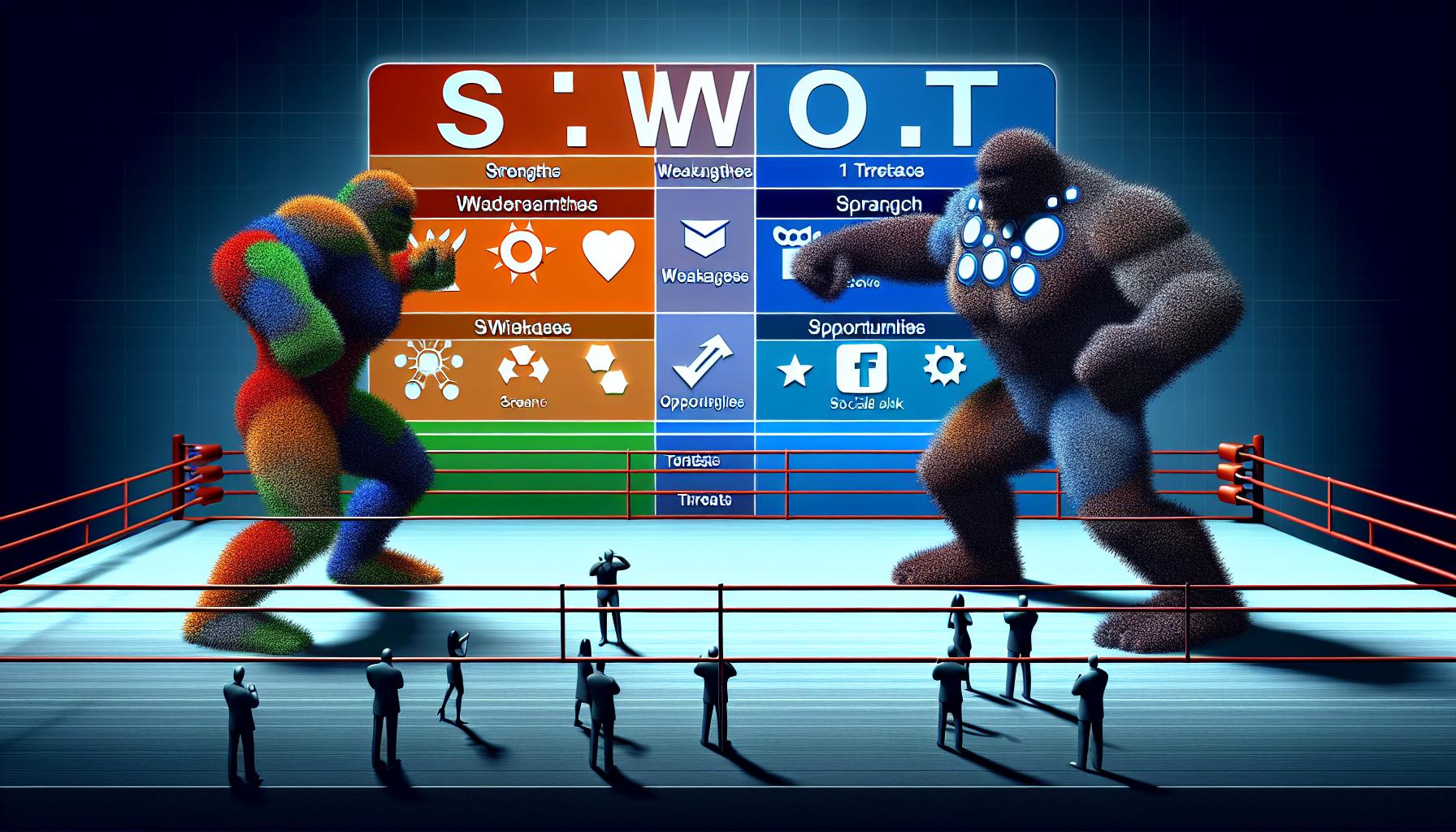Comparing the Strengths and Weaknesses of Google and Facebook
Google and Facebook are two of the largest tech companies that dominate the internet landscape. Each company possesses unique strengths and weaknesses that contribute to their overall success.
Starting with Google, one of its greatest strengths lies in its search engine algorithm. Google’s search engine is renowned for its accuracy and relevance, which has made it the go-to choice for billions of internet users worldwide. Additionally, Google has diversified its product offerings beyond search, with products like Google Maps, Gmail, and YouTube, further expanding its reach and user base. Another significant advantage for Google is its vast data infrastructure, allowing it to process and analyze massive amounts of data efficiently.
On the other hand, Facebook’s strength lies in its social networking platform, which boasts a staggering user base of over 2.8 billion monthly active users. This vast user base provides Facebook with an extensive network effect, making it difficult for competitors to penetrate the market. Moreover, Facebook’s acquisition of Instagram and WhatsApp has further solidified its position in the social media realm. These acquisitions have allowed Facebook to expand its reach and diversify its offerings to cater to different user preferences.
However, both Google and Facebook also have their fair share of weaknesses. Google’s weakness lies in its heavy reliance on advertising revenue. Around 80% of Google’s revenue comes from advertising, making it susceptible to fluctuations in the advertising market. Additionally, Google has faced scrutiny over privacy concerns and antitrust issues in recent years, tarnishing its reputation and potentially affecting user trust.
Similarly, Facebook has faced its own set of weaknesses. The company has faced significant criticism for its handling of user data and privacy issues, leading to multiple regulatory investigations and fines. Additionally, Facebook’s reliance on advertising revenue, similar to Google, makes it vulnerable to changes in the advertising landscape. The rise of ad-blocking software and increased competition for advertisers’ attention poses a threat to Facebook’s revenue streams.
Analyzing the Opportunities for Growth in Google and Facebook
Despite their strengths and weaknesses, both Google and Facebook have several opportunities for growth. Google has the potential to further expand its presence in the cloud computing market. With its Google Cloud Platform, Google can leverage its existing infrastructure and data capabilities to compete with established players like Amazon Web Services and Microsoft Azure. Additionally, Google can explore new business verticals, such as healthcare and artificial intelligence, to diversify its revenue streams further.
For Facebook, the opportunities lie in monetizing its platforms beyond advertising. The company has already made strides in this direction with the introduction of Facebook Shops, a platform that allows businesses to sell products directly on Facebook and Instagram. Facebook can continue to explore e-commerce opportunities and tap into the growing online shopping trend. Additionally, the company can leverage its vast user base to enter the digital payment space, similar to platforms like PayPal and Venmo.
Examining the Threats Faced by Google and Facebook
Both Google and Facebook face several threats in the ever-evolving tech landscape. One of the most prominent threats is increased regulatory scrutiny. Governments around the world are becoming more vigilant about privacy concerns, data protection, and antitrust issues. Both companies have already faced significant fines and investigations, and stricter regulations could potentially hinder their operations and growth prospects.
Another threat is the emergence of new competitors. While Google and Facebook may currently dominate their respective markets, new players can disrupt the status quo. For example, in the search engine market, alternatives like DuckDuckGo and Ecosia are gaining popularity among users who prioritize privacy and sustainability. Similarly, social media platforms like TikTok have gained traction, particularly among younger demographics, posing a challenge to Facebook’s dominance.
Unveiling Key Metrics: A Comparative Analysis of Google and Facebook
When comparing key metrics, Google and Facebook exhibit impressive numbers. Google’s parent company, Alphabet, reported a total revenue of $182.5 billion in 2020, with advertising accounting for the majority of its revenue. The company also reported a net income of $40.3 billion for the same period. In comparison, Facebook reported a total revenue of $86 billion in 2020, with advertising contributing the bulk of its revenue. Facebook’s net income for the year was $29 billion.
In terms of user engagement, Google’s search engine handles over 5.6 billion searches per day, while YouTube has over 2 billion logged-in monthly active users. Facebook, on the other hand, boasts an impressive 1.84 billion daily active users on its platform, with over 2.8 billion monthly active users across its family of apps.
Implications and Outlook: Who Comes out on Top – Google or Facebook?
In the battle between Google and Facebook, it is challenging to declare a clear winner. Both companies have their strengths and weaknesses, and their market dominance continues to grow. However, the future landscape poses challenges that could impact their growth and profitability.
While Google’s diverse product portfolio and dominance in search engine technology provide a solid foundation for continued success, it needs to address privacy concerns and reduce its reliance on advertising revenue to mitigate potential threats. On the other hand, Facebook’s massive user base and acquisitions have cemented its position in the social media market. However, the company must navigate regulatory hurdles and diversify its revenue streams beyond advertising.
Ultimately, the winner in this battle will be the company that successfully adapts to changing consumer demands, addresses privacy concerns, and finds new avenues for revenue growth. Both Google and Facebook have the resources and capabilities to thrive, but only time will tell who emerges as the ultimate victor in this ongoing rivalry.













